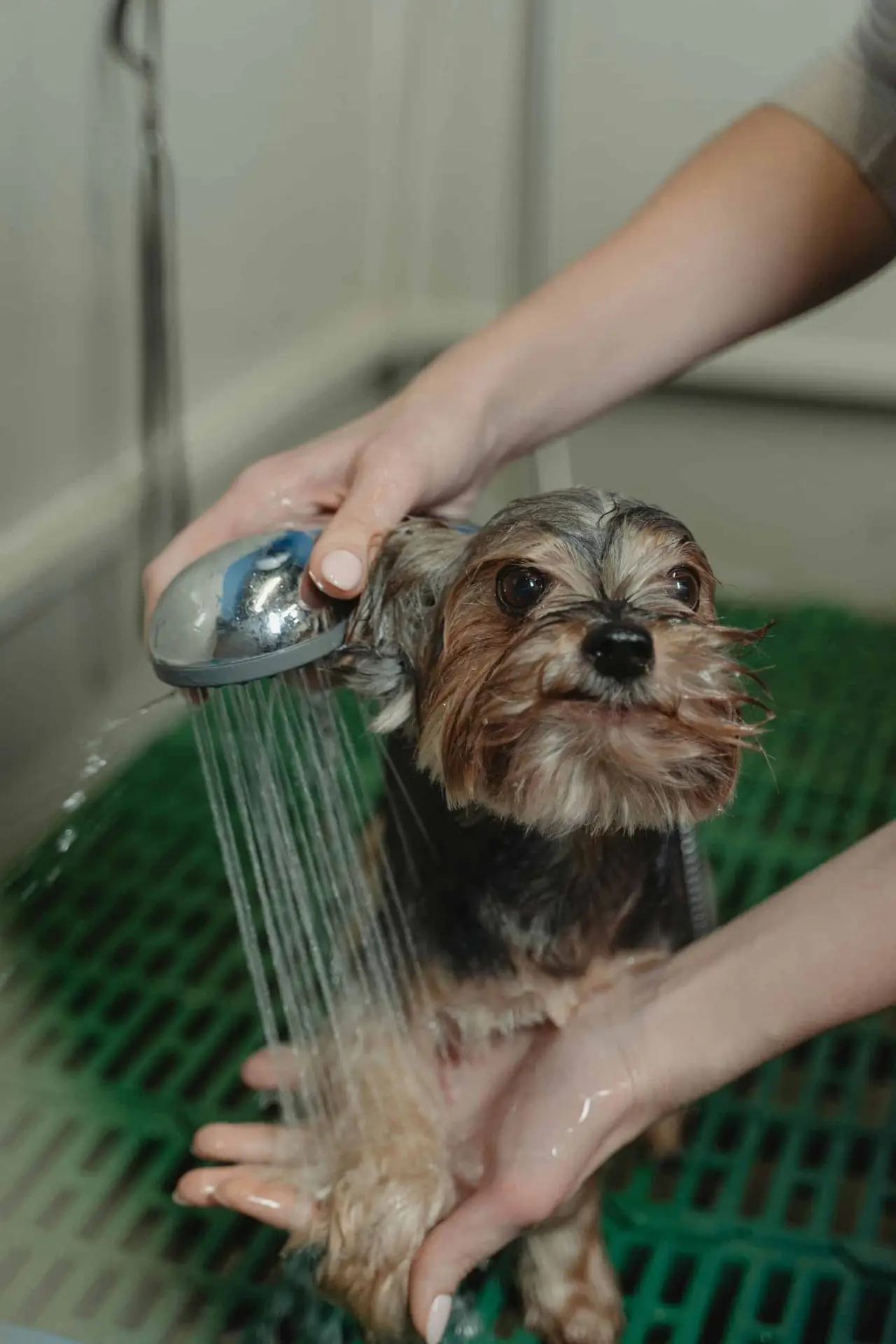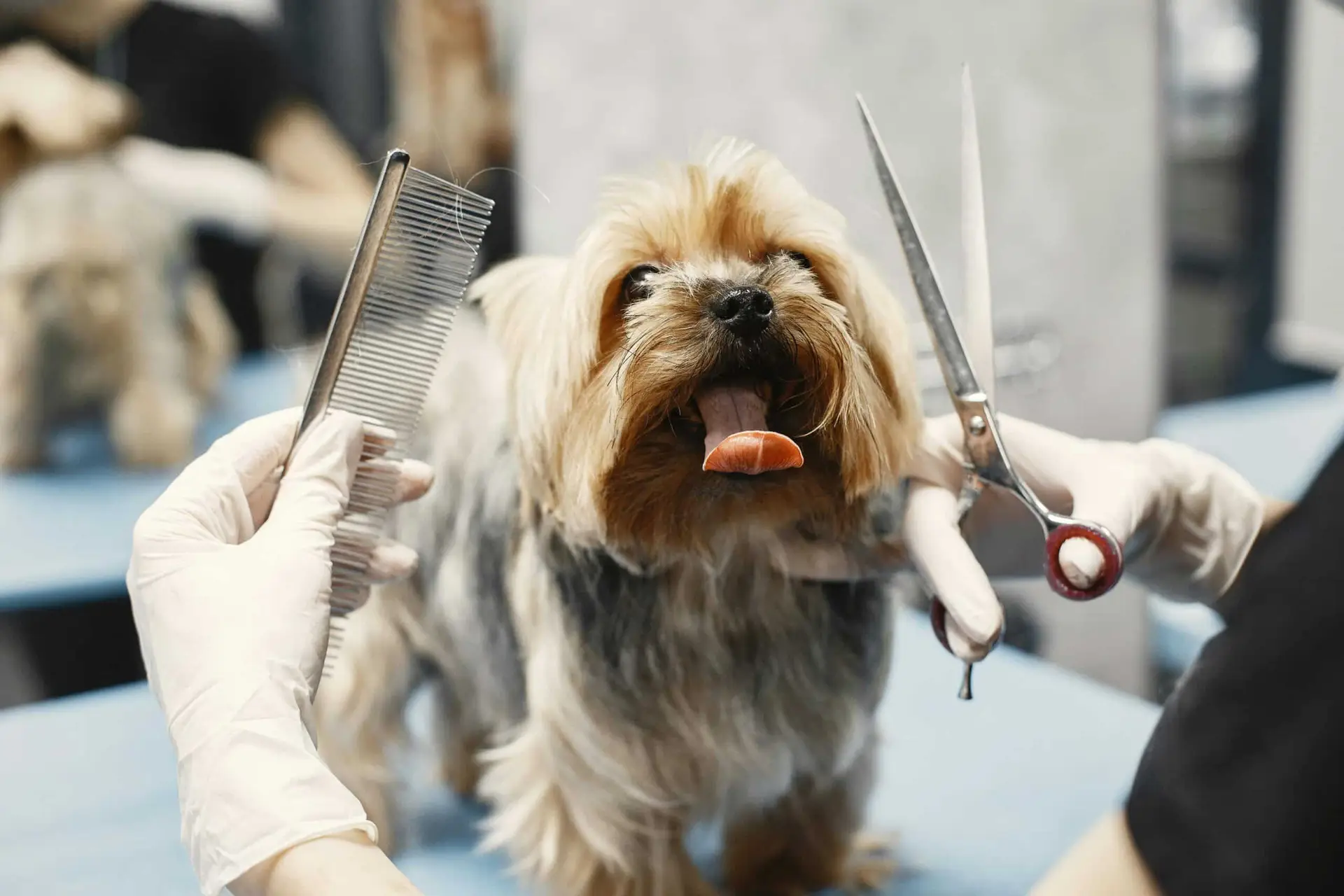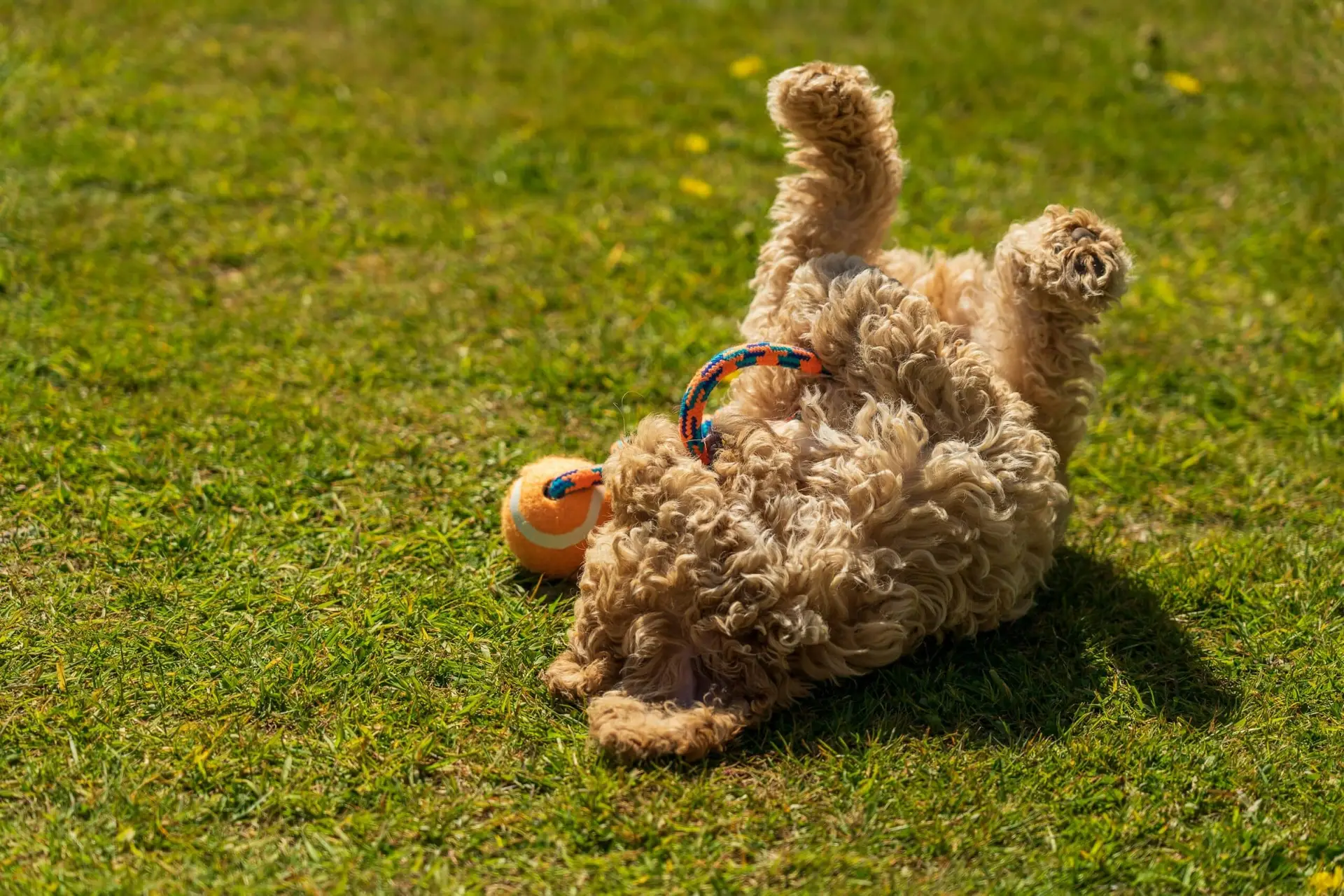Have you ever seen your little dog scratch, lick or bite the skin? You may be worried about what is causing his/her discomfort. Itchy skin is a common issue for dogs and especially for smaller breeds. It can be a variety of reasons like from allergies to dry skin or to parasites. But fortunately, there are a lot of things you can do to help prevent and address itchy skin in your little dog. In this post, we will discuss the general causes of itchy skin and some ways to prevent it from occurring again, and give you simple tips on maintaining a small doggie free of itch.
Disclosure: This post may contain affiliate links and I may receive a small commission if you purchase through them. There is no additional charge to you. Please refer to our disclaimer and disclosure for further information.
What has happened to cause your little dog’s itchy skin?
In order to know how to prevent itchy skin in small dogs, you first have to understand why your dog may suffer from the predicament. Many things can make your dog itch and finding the cause is key to a successful treatment plan.
1. Allergies
Skin allergies are one of the most frequent reasons that small dogs experience itchy skin. Yes, dogs can have allergies. There are a number of allergies that dogs can suffer from, including:
- Food Ingredients: common allergens such as chicken, beef, dairy and grains used in dog food can be the cause for allergic reactions. Itching, swelling and sometimes gastrointestinal signs are symptomatic of food allergies in some dogs.
- Environmental allergies: Dogs may also be allergic to components in their surroundings, such as pollen, or house dust mites. This condition usually occurs with an itch particularly for those people who have seasonal allergies and its seasons of the year.
- Flea Allergies: A number of dogs suffer flea allergies — being bitten by only one flea can trigger a massive itchin- fest. This is a condition called flea allergy dermatitis, which causes such swelling and redness, that it becomes followed by scabbing and hair loss in the area.
2. Dry Skin
Commonly found in smaller breeds, dry skin can be another cause of itchiness for your little dog. Small dogs with short coats like Chihuahuas or French Bulldogs are likely to battle dry skin issues in the winter because they have less natural insulation against the typically dryness in the air. When there is no moisture in the air your skin can start to dry out and become flaky; add into this vicious cycle scratching irritated skin, which only irritates the problem further.
3. Parasites
In addition to allergic skin conditions (which include flea allergy, food sensitive dermatitis and atopic disease), parasites can cause itchy skin such as fleas / mites/ ticks. The most prevalent of these are fleas, which can lead to severe itching in dogs that may be allergic to flea bites and infestation. Mites are another one of the common causes of mange and a dog with this issue will be very itchy, which should come as no surprise.
4. Infections
Bacteria or fungi infections can lead to itchy skin.
In more serious cases of scratching, enough pressure is applied to the skin to not only cause a break in the epidermis or dermis levels but also significantly increase risk for infection. Another thing is that yeast infections especially can be extremely itchy and usually occur around the ears, paws, or skin folds.
5. Underlying Health Conditions
Itchy skin may be a sign of underlying health issues like hypothyroidism or autoimmune diseases. If this has been ongoing and your dog does not seem to have allergies, dry skin, or parasites, you should take your dog to the vet because other medical issues need to be addressed.
By keeping an eye on when these symptoms happen and taking your dog to the vet, you may be able to pin down the allergen. Your vet might also suggest allergy testing or a hypoallergenic diet to determine the specific trigger and get your dog feeling better.
Prevent Itchy Skin in Your Small Dog
When it comes to your small dog, prevention is worth a pound and a scratch! However, you can keep your dog looking and feeling great by following these steps to prevent skin problems from developing in the first place.
1. Provide Your Dog with Proper, Quality Nutrition
Obviously, feeding is a critical element in any dog’s overall health and the condition of their skin and coat. A high-quality balanced diet supplemented with essential fatty acids (Omega-3 and Omega-6) will play a pivotal role in promoting healthy skin, as well reducing inflammation.
- Consider Limited Ingredient Diets: If your dog has food allergies, you may also want to consider changing his/her diet to a limited ingredient one. The goal is to select a few main ingredients so it’s easier to pinpoint and avoid potential allergens. To avoid decreasing the protein value in foods, search for brands that are free from filler (soy, grains, dairy) and packed with high end protein ingredients suitable for dogs.
- Include omega fatty acid: Omega-3 and -6 essential fatty acids, found within fish oil or flaxseed essential oil are excellent for skin health. Both of these fats work to reduce inflammation and assist the skin in maintaining its natural barrier function, which helps to reduce itching caused by dryness or irritation.
- Hill’s Science Diet Sensitive Stomach & Skin,Adult 1-6, Stomach & Skin Sensitivity Support,Wet Dog Food,Variety Pack:Chicken & Vegetables; Salmon & Vegetables Loaf,12.8 oz Can Variety Pack, Case of 12
- Hill’s Science Diet Sensitive Stomach & Skin, Adult 1-6, Stomach & Skin Sensitivity Support, Small Kibble, Dry Dog Food, Chicken Recipe, 4 lb Bag
- Pet Honesty Omega SkinHealth chews for Dogs, salmon oil, Omega 3 Fish Oil, Krill, Spirulina, Omega-3, Alaskan salmon oil, Healthy Skin & Coat, Itchy Skin, Dog Allergies, May Reduce Shedding (90 Count)
2. Regular Bathing and Grooming

Another crucial step to avoid itchiness in your small dog is proper bathing and grooming. That said, it is important to be cautious when bathing your dog as over-bathing can take nutrients from the skin along with getting rid of oils at high levels which may result in dryness and itchiness.
- Hypoallergenic shampoo: Choose an allergy free foam shampoo that is specifically made for dogs. Avoid using human shampoos as it may be too harsh for your dog’s skin. Ingredients such as oatmeal or aloe vera are excellent for calming the skin and will help to relieve itching.
- Bathe schedule: Once every 3–4 weeks (…depending on your dog’s breed and activity level…) However, if your dog has certain skin conditions, then more frequent baths using medicated shampoos may be required as advised by the vet.
- Regular Dog Coat Brushing: Regular brushing helps to reduce loose fur, dirt and allergens that may stick on your dog’s skin. This also encourages blood flow for cleaner skin. For small dogs with long or curly coats, such as Shih Tzus or Poodles, brush daily or every few days can help to prevent tangling and matting, which could increase skin irritation.
3. Tips To Keep Fleas and Other Parasites Away from Your Dog
Preventing parasites to avoid itchy feelings from your dog. One of the major causes that dogs itch is from flea bites and even indoor dogs can be exposed to fleas. By staying on top of parasites prevention, you can greatly reduce and control your dog on developing itchy skin.
- Give Flea Prevention Products a Try: There are numerous flea prevention products out there. Such as topical treatments, flea collars, and oral medications. Opt for a product which is safe to use on small dogs and make sure that he or she stays protected by sticking with the regimens.
- TevraPet Activate II Flea and Tick Prevention for Dogs | 4 Count | Medium Dogs 11-20 lbs | Topical Drops | 4 Months Flea Treatment
- Regularly check for Fleas and Ticks: Besides having your dog on a flea prevention, you should also periodically be checking your dog for fleas & ticks. Especially when walking through wooded areas or taller grasses. Fleas can hide in your dog’s fur and ticks often attach around the neck, ears or even between toes.
4. Keep Their Environment Clean
Your small dog’s skin health could also be a victim of the environment. Dust, mold and allergens in your home can cause itchy skin, particularly for dogs with environmental allergies.
- Wash All Bedding and Toys: Washing your dog’s bedding, blankets, toys regularly will reduce allergens such as dust mites or pollen. A mild but pet-friendly detergent can help prevent any further skin irritation.
- Keep the indoor humidity: Dry air canmake your dog’s skin worse.Having a humidifier in your house can assist to keep the air hydrated and stop dry skin from developing on your dog.
5. Consistent Veterinary Exams Including Skin Observations

Routine veterinary care is important to prevent and manage itchy skin. Your vet can help to identify any potential skin issues early on and recommend treatment options if needed. Regular checkups are also important for keeping up with flea and parasite prevention.
- Regular Wellness Veterinary Care: Essential in Itch Management & Prevention Your vet can spot potential skin problems and guide you on identifying the treatment required. Similarly, periodic exams are crucial to maintaining flea and parasite control.
- Annual Checkup: Deceptively unsuspecting small dogs should be taken to the vet for an annual check even when they seem well. If you have an overweight dog this is when your vet can weigh and monitor weight every visit as well as check skin, allergies, infections show up and parasite prevention will be done.
- Watch for Infection: If he’s scratching a lot, or has open sores, redness, scabs — get him to the vet.runners; autoimmune. There are a number of other diseases which can cause similar symptoms and may be related to an underlying infection or condition that needs treatment.
Home remedies to cure Itchiness
There are a few natural solutions that we can use to relieve your small dog of itchy skin apart from the above preventative measures. These are especially effective for dogs that has mild symptoms on dry skin or minor allergies.
1. Oatmeal Baths
The anti-inflammatory properties of oatmeal can reduce itching and irritation on the skin. You can buy a dog oatmeal shampoo or create an at-home oar bath by blending regular unsweetened oats until they turn into finely ground powder and stirring it well to warm water for bathing. Allow your dog to soak in the oatmeal bath for 10-15 minutes to alleviate itching.
- Oatmeal Dog Shampoo & Conditioner 17oz [USA] 5 in 1 Plant-Based Organic Sulfate-Free Soap-Free-Tearless Moisturizer for Dandruff Allergies & Itchy Dry Sensitive Skin-Puppy Grooming [Pro Pet Works]
- Wahl USA Dry Skin & Itch Relief Pet Shampoo for Dogs – Oatmeal Formula with Coconut Lime Verbena & Pet Friendly Formula, 24 Oz – Model 820004A
2. Coconut Oil
Applying coconut oil directly to your dog’s skin is another home remedy treatment for dry, irritated skin. The fatty acids in it help keep skin hydrated and reduce inflammation. Rub in a pea-sized amount of coconut oil on the area, you don’t want to give your dog greasy hair.
- Raw Paws Virgin Organic Coconut Oil for Dogs & Cats, 4-oz – Treatment for Itchy Skin, Dry Nose, Paws – Hot Spot Lotion for Dogs – Natural Hairball Remedy for Dogs
- Palmer’s for Pets Cocoa Butter Formula Direct Relief Lotion Spray for Dogs with Vitamin E | Fragrance Free Dog Lotion for Dry Itchy Skin Spray On Lotion for Dogs – 8 oz (FF15584)
3. Aloe Vera Gel
Aloe vera gel is an established natural treatment for irritated skin and can be highly effective at stopping itchiness in small dogs. This enzyme and mineral rich gel found at the base of an aloe vera plant aids in reducing inflammation, which makes it ideal for soothing hot spots, rashes or other irritations on your pooch. Aloe vera applied to your dog’s skin can cool it instantly, making itchiness from allergies, bug bites or dryness bearable.
One of the many advantages of this plant is that it contains natural antibiotic agents, so in its irrigation areas infections are avoided. Hyperactive scratching can be especially troubling, as it may result in broken skin and open sores.
If you do opt to use aloe vera, choose a pure natural form of the gel (without any added chemicals or additives). You can apply it directly to trouble areas ( i.e. your dog’s paws, belly or behind the ears. But be careful that your dog does not swallow it, as a lot of intake can lead to digestive troubles. Carefully used, aloe vera is an excellent home remedy to soothe your little dog’s skin inflammation due to itchiness.
4. Apple Cider Vinegar
Apple cider vinegar (ACV) is a frequently cited natural cure for alleviating small dog itchy skin. Mixed with water, ACV can alleviate the discomfort from skin allergies, infections or minor cuts. Its acidic nature helps adjust pH levels on the skin, and it also makes Bacteria or Yeast cannot live in such a harsh environment. It is especially necessary if your dog has itchy skin because of fungi or bacterial infections. Spraying or rinsing your god in a dilute ACV solution can relieve inflammation and ease the itch caused by scratching and biting.
ACV can also help the overall condition of your dog’s hair and fur. Used on the skin, it can help whip away any dirt, impurities and oils from sitting in there that might be causing you to scratch your scalp. The vinegar besides being an antiseptic also works as a natural deodorizer, removing all the smells that stubbornly cling to your pet’s skin and fur.
And, as always, apply diluted ACV to dog skin only, not straight on the area otherwise you will surely cause irritation. Combine equal amounts of apple cider vinegar and water in a spray bottle, then lightly mist your dog’s skin. Use caution and do NOT apply to open sores or broken skin. If you make a solution of water and ACV, using this on your small dog regularly can help with keeping their skin healthier to ultimately decrease how often they feel itchy.
Finish: Prevention of Itchy Skin in Small Dogs
In small dogs, itchy skin can lead to many complications and here we have discussed some of the tips that will help you to take a proactive approach for preventing your dog’s allergies by giving a proper diet, making cleanliness around your puppy with regular grooming and prevention from parasites as well. By knowing the common reasons why your pup is itchier than usual, you can help get your dog back to a healthy state practically lickity-split. Regular vet checkups as well as all natural remedies such as oatmeal baths or coconut oil, can assist in relieving irritation and help maintain your pet dog satisfied and healthy.
Prevention, early intervention and routine care will hopefully stop your small dog from ever knowing the aggravation of itchy skin. Following these methods, in addition to the above treatments will also assist your beloved furry companions lead a more bearable and itch free life!








